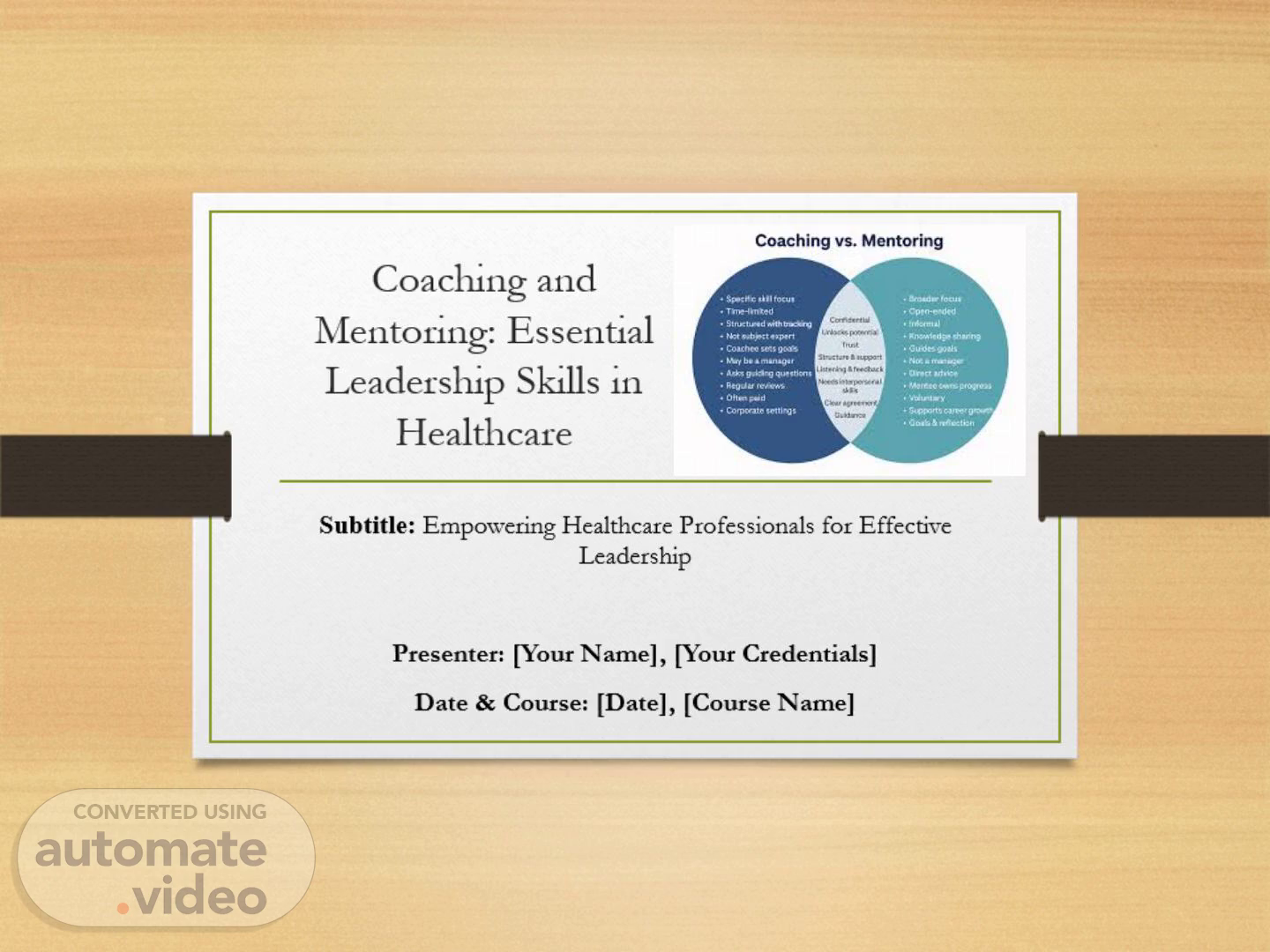
Coaching and Mentoring: Essential Leadership Skills in Healthcare
Scene 1 (0s)
[Virtual Presenter] Good morning, my name is [Your Name]. Today, we are talking about critical skill sets for mentoring and coaching in healthcare. These are needed toto develop leaders who perform well in high-speed healthcare environments, direct highly functioning health organizations, and focus on delivering optimally effective patient outcomes. This presentation will provide brief definitions for mentoring and coaching, detail their benefit for health organizations, and demonstrate applying them in practice..
Scene 2 (32s)
[Audio] This session aims to help students grasp core concepts and the importance of coaching and mentoring for health leadership. The students will be able to define coaching and mentoring and contrast them from their distinct characteristics. They will be able to outline how coaching and mentoring develop their leadership skills and make them adaptable and versatile for use in fast-paced health settings. Learners will use practical coaching and mentoring skills for team building, eventually leading to enhanced patient treatment outcomes. According to Bloom's taxonomy, these learning objectives comprise knowledge acquisition, comprehension, and use, allowing students to acquire concept-based knowledge and skills transfer. Health leaders who develop these skills can establish robust, collaborative teams that perform well under the complexities of today's clinical practice..
Scene 3 (1m 22s)
[Audio] Coaching is a goal-oriented, brief, performance-based process for building leadership and resilience in health managers. However, mentoring is a development-oriented, long-term relationship that fosters professional development, interprofessional work, and identity formation (Juntunen et al., 2025). Both coaching and mentoring enhance retention, staff engagement, and patient safety through reflection in practice and ongoing learning. Both practices align with situational and transformational theories of leadership, which focus on motivation, personalized support, and flexibility (Hu et al., 2024). Engaging in coaching and mentoring develops adaptive clinical leaders who can lead across complex clinical settings and maximize quality of care through empowered, collaborative working teams..
Scene 4 (2m 13s)
[Audio] Effective mentoring and coaching in healthcare entail practical strategies like effective listening, good communication, and goal setting using SMART objectives for directing development (Hu et al., 2024). Healthcare leaders need to customize their approach through evaluation for staff readiness and modulation accordingly, following Situational Leadership principles (Abela, 2023). Giving timely positive feedback and encouraging reflective practice facilitates personal growth and awareness. Challenges may be time restrictions, resource limitations, and resistance from organizational cultures. Such obstacles can be overcome by prioritizing leadership development, obtaining organizational buy-in, and integrating coaching into regular workflows (Agnel et al., 2025). Such practices help leaders create flexible, resilient teams that provide high-quality care..
Scene 5 (3m 11s)
[Audio] Common obstacles to effective coaching and mentoring in healthcare include a lack of available time, ambiguous role definitions, and a lack of dedicated resources, which commonly constrain leaders from fully participating in these development opportunities (Hu et al., 2024). Organizational cultures that resist change can also hinder the adoption of coaching and mentoring practices. To overcome such obstacles, healthcare organizations must invest in development programs for coaches and mentors and ensure these individuals have the requisite skills and confidence. Leadership commitment is required to prioritize coaching and mentoring, allow for proper time allocation, and embed these into workflows (Agnel et al., 2025). A positive, continuous growth-enhancing organizational environment will drive participation and foster momentum. Such findings raise important questions for discussion: How do healthcare leaders optimize their dual roles as mentors and coaches? What strategies best overcome organizational obstacles and develop effective coaching and mentoring supporting environments? As we come to a close, remember future assignments working with coaching and mentoring. You will have three reflection assignments where you will apply coaching and mentoring in your practice and a final paper where you will synthesize major concepts from this subject matter. You will also need to participate actively in the discussion forum posts, where you will comment on real-life coaching and mentoring examples. All activities have been put into place to further your knowledge and enable you to apply these leadership skills proficiently in healthcare environments..
Scene 6 (4m 51s)
References. Abela, S. (2023). Leadership and management in healthcare: A guide for medical and dental practitioners. Springer Nature. https://doi.org/10.1007/978-3-031-21025-9 Agnel, C., et al. (2025). The impact of the evidence-based practice mentor on nurses: A scoping review. Worldviews on Evidence-Based Nursing. https://doi.org/10.1111/wvn.70016 Gantz, N. R., & Hafsteinsdóttir, T. B. (2023). Mentoring in nursing through narrative stories across the world. Springer Nature. https://doi.org/10.1007/978-3-031-25204-4 Hu, S., Välimäki, M., Liu, S., Li, X., Shumaila, B., Huang, W., ... & Hu, J. (2024). Coaching to develop leadership of healthcare managers: A mixed-methods systematic review. BMC Medical Education, 24(1083). https://doi.org/10.1186/s12909-024-06081-y Juntunen, A., et al. (2025). Healthcare professionals’ experiences of competencies in mentoring of interprofessional students in clinical practice. Journal of Advanced Nursing. https://doi.org/10.1111/jan.16347.